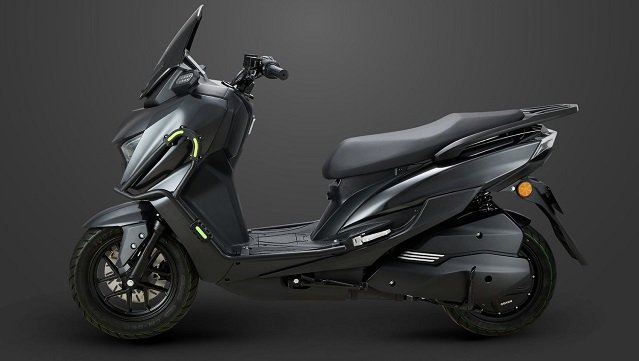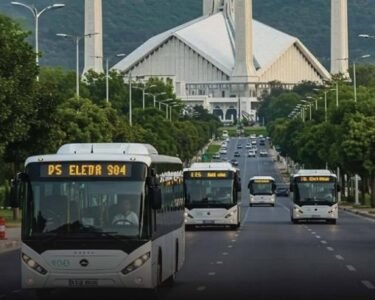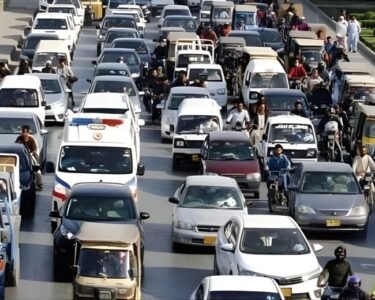Pakistan’s electric vehicle (EV) sector is gaining rapid traction, with local production of affordable two-wheelers driving record-breaking sales of 1.4 million units in 2024. This significant milestone underscores the country’s growing interest in sustainable mobility, despite systemic challenges.
At the heart of this transformation was the 2nd Electric Vehicles (EV) Conference held in Lahore, organized by the Climate Action Centre (CAC) and PakEVO, with sponsorship from the Bank of Punjab. The event brought together industry leaders, policymakers, financiers, and climate advocates to chart the future of EV adoption in Pakistan.
Pakistan’s EV Sector: Potential and Pain Points
While the conference celebrated recent gains, such as the surge in electric two-wheeler sales, it also highlighted pressing obstacles hindering the broader EV transition. From inadequate charging infrastructure to limited financing options, stakeholders agreed that Pakistan must urgently address these issues to build a viable EV ecosystem.
In his keynote address, Umer Khan, Head of Investment Banking at the Bank of Punjab, stressed the pivotal role of government support. Citing international examples, Khan emphasized that subsidies, tax credits, and access to climate finance are essential to scale EV adoption.
“Consistent with global experience, the big push for EVs comes with tangible government support,” Khan noted, adding that Pakistan has the opportunity to leverage international climate funds if the right strategies are implemented.
Localization: Key to Sustainable Growth
Localization emerged as a central theme at the conference. Nauman Alvi of EVEE Motors highlighted how local production of two-wheelers had fueled the market boom, and urged similar efforts for EV parts manufacturing, starting with plastic components to reduce costs further.
Saleha Hassan from DFML echoed this sentiment, advocating a shift from Completely Built-Up (CBU) imports to local assembly via Completely Knocked-Down (CKD) kits. She emphasized that EVs should be viewed as utility vehicles, not luxury products, pointing out that hatchbacks account for 52% of EV sales.
The speakers collectively urged the government to create policies favoring local assembly, noting that Pakistan could become a regional manufacturing hub for electric vehicles.
Infrastructure and Financing: The Missing Links
Despite the market’s upward trend, Pakistan’s charging infrastructure remains a major hurdle. Current facilities restrict EV usage to short-distance commutes, making long-distance electric mobility a challenge.
Companies like Daewoo Pakistan are taking steps to bridge this gap, with plans to replace diesel buses with electric buses on shorter intercity routes like Lahore to Sialkot within the next two years. However, scaling these operations for longer routes will require significant investment in infrastructure.
Financing is another critical bottleneck. High battery costs and limited access to consumer financing prevent many potential buyers from entering the EV market. The success of initiatives like the CM Punjab’s Interest-Free Bike Scheme offers a potential blueprint for scaling affordable EV financing solutions.
Innovative models such as green bonds, battery leasing, and public-private partnerships were discussed as promising solutions. Conference speakers cited examples like the US Inflation Reduction Act and Europe’s zero-interest loans as strategies Pakistan could adopt to spur investment.
A Call to Action
Dr. Aazir Khan, introducing PakEVO, a new platform dedicated to EV education and policy reform, stressed the urgency of aligning Pakistan’s fiscal priorities with sustainable energy goals, especially as climate resilience becomes increasingly critical.
Yasir Husain, Director at CAC and chief organizer of the event, summed up the spirit of the conference by calling for immediate, tangible action.
“Climate action needs to move from buzzwords to boardrooms, from talks to transactions,” Husain said, emphasizing that EVs represent a bridge between economic resilience and environmental responsibility.
The Road Ahead
Pakistan’s youthful population, coupled with the global surge in EV adoption—which grew by nearly 40% between 2023 and 2024—presents an unprecedented opportunity.
Stakeholders at the conference agreed: building a national EV ecosystem is no longer optional—it is an economic and environmental necessity.
With coordinated public-private collaboration, supportive government policies, and strategic investment in infrastructure and localization, Pakistan’s EV sector could not only catch up with global trends but also become a regional leader in electric mobility.






